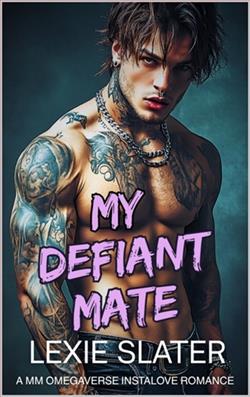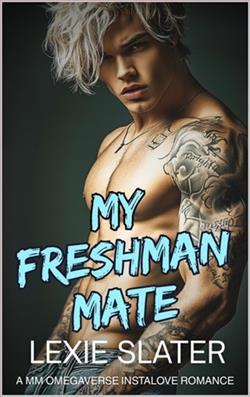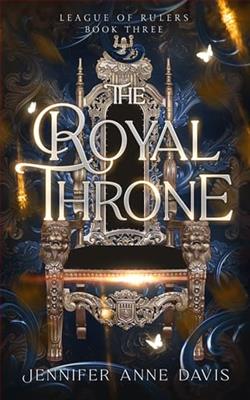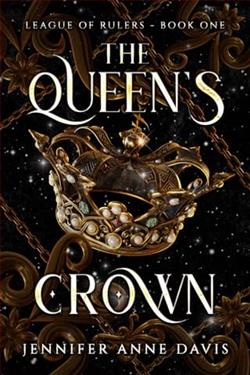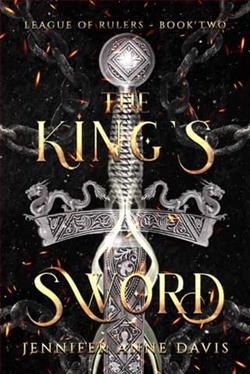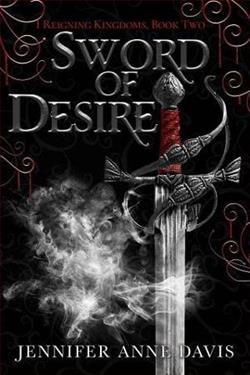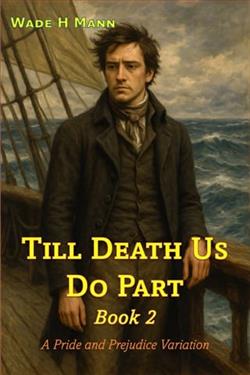Page 7 of Vaquero
There was nothing left of the orphanage worth saving. Julio would know. Back in his Navy days, he’d seen absolute destruction like this in Iraq and Bosnia, then Afghanistan. Back when he had something and someone to come home to. Still...
Two ragged marks declared something had been dragged around the scattered stones of the firepit and into the forest. Too short and jagged, too irregular to be tire treads, the tracks told him that something heavy had been moved. Perhaps a travois like the early American Indians used when they’d moved their villages? A sled like that could’ve hauled whatever valuables hadn’t been burned by the fire. Or children. Possibly bodies. Which meant someone had survived. Or a looter had been here. Either way, Julio needed to know where Oz was now, and what had happened to Corporal Duncan.
Leaving the destroyed orphanage behind, he set a quick, but silent pace, following those tracks through the thick woods and shrubs that comprised this part of Brazil.
Man, this day just wouldn’t quit. It had already been damned long. In the middle of last night, he’d touched down at Rio de Janeiro’s international airport after an hours-long flight out of Houston. Then, because there was no choice, he’d risked his life on an independently-owned puddle-jumper to Pampulha in Brazil’s highland state of Minas Gerais. The short, bumpy flight in a prehistoric Cessna had landed Julio at an out-of-the-way jungle runway that looked like something drug runners used.
But the harrowing flight had still left him short about fifty miles from OZ Metallurgy Mining, Inc. By ten the next morning, he was exhausted, grimy, and sweaty, but he had located a bus going in that direction. By noon he was onboard, holding the ragged, grimy suicide strap inside an over-crowded and frighteningly dilapidated form of what Brazilians called transportation. He shared that leg of his journey with a couple dozen locals, several tattooed men from one of the four indigenous tribes in the state, chickens, two pigs, and a baby goat that left stinky little goat-pellets wherever it bounced.
And away he went. Past a collection of colonial towns, all loaded with remnants from the state’s phenomenal Baroque history. Away from the elegant stretches of manicured lawns and red-tile-roofed mansions. Past the patchwork quilt of rich, green cornfields intermingled with banana orchards and fields full of cattle. Away from civilization with its order and decorum. Into the rural heartland of Mina Gerais with its forests full of tamarin monkeys, snakes, and roving bands of wanna be guerillas.
Once the bus left the pavement behind, it took excruciatingly long hours traversing the sometimes there, sometimes not there, sometimes imaginary, steep, back roads. The last time its bald tires ground to a squeaky stop, which had been in the middle of nowhere to let the woman with five live chickens shoved into her brightly woven basket off, Julio had simply climbed out with her and melted into the forest. He couldn’t take anymore.
Julio was now following tracks that would, hopefully, lead him to the aid-worker’s latest attempt to hide. Though why anyone in their right mind located a home for parentless children near one of Oz’s mines was beyond Julio’s comprehension. Duncan had to be as crazy as Oz.
After Duncan was out of the way, Julio intended to backtrack and establish a sniper hide near OZ Mining. Ending Orlando Zapata wouldn’t take long. Eventually, he’d return to his home base, and when he did, Oz would never hear the round that would, most assuredly, end his reign of terror.
But for now, Julio had a missing aid-worker to corral. And he was tired. He’d brought a smaller gear bag with him instead of his usual LBE, a hefty pack that normally carried hisload bearing equipment. For this excursion, he’d only brought a couple bottles of sports drink and his blow-out kit. Toilet paper. Fingerless gloves. Beef jerky. Protein bars. Plenty of ammo for the pistols now sheltered beneath his button-up shirt. He wasn’t here to make friends, and he didn’t care if he lived or died. He’d only come to Brazil to stab at the heart of an enemy he couldn’t reach. Nothing more.
The simple exercise of tracking what had turned out to be three, maybe four people pulling some kind of travois through trees as thick as those in the forest, was therapeutic for a hardened operator. Julio honestly liked Brazil. It was an easy country to fall in love with, and he’d come to care for its wide diversity of people.
Whether of Portuguese, African, or European descent, or one of the hundreds of native tribes still holding onto their way of life, Brazilians were no different than others. They wanted to be left alone to raise their families. They wanted jobs and national security. That was what mattered to all peoples of the world. Until greedy men like Domingo and Orlando Zapata came along and ruined those simple wants and needs for everyone.
Julio had spent years in Brazil during one of his past lives. Back then, he’d been an undercover operator, posing as security for the boss of a drug cartel who’d foolishly decided he could move his bloody business into Northwest America, as in Portland, Oregon. It hadn’t worked out so well. What was left of that drug lord’s carcass now rested in an unmarked grave on a tiny island off the coast of Costa Rica. Julio was the operator who’d ended the bizarre alliance of the three criminals: Viktor Patrone, Mitchel Franks, and Benito Garcia. All murderers. All psychotic. Each as despicable as the other. He’d set the explosive that literally rocked Franks’ island off its foundation. And he’d do it again.
Personally, Julio found it blasphemous the way most drug pushers wanted, no, needed, to be called druglords. As if they, the scum of the Earth, were better than their victims? Than the grieving parents and families their victims left behind? The arrogance of greedy men and women the world over never ceased to surprise Julio. He’d seen too much of it in his short thirty-three years.
He kept his eye on the ruts and broken grasses, branches, and other tells marking his path. Walking and tracking. Finally, something he could do.
Yet even the sacred number of his age bothered Julio now. It irked him. At thirty-three, Christ, the real Lord, had suffered and died for mankind. He’d laid down his life. Or so the priests said. But even they’d eventually besmirched the purity of the gospel they’d all claimed the Lord had died for. All those pedophile priests… All those liars and accomplices to the worst crimes imaginable, pedophilia and rape. Deceit.
Julio still hadn’t forgiven the church for its crimes against so many children or for the priests they’d shielded from justice for far too long. Didn’t know if he ever could. No father should.
The point behind Julio’s vast well of angst was merely that Christ had accomplished much more than him during His short thirty-three years. He’d saved the world. What had Julio accomplished with the same amount of time? Nothing. If anything, he’d digressed since Domingo Zapata kidnapped his family. He’d sinned. He’d rung out of his one and only chance to be a Navy SEAL. After that, he’d deserted his buddies, even Kruze, who’d always seemed more of a brother than just a friend.Who does that?What kind of man turns his back on his brothers?
As if those sins weren’t enough, Julio had been a piss poor husband. Any man who’d lost his poor wife to depression, then suicide, proved that in spades. Then Tomas, the son he still loved with every fiber of his broken, shattered heart, the son he still cried for, had died from, of all things, failure to thrive. As if Julio hadn’t slept with that sweet boy laying on his chest every single night since he’d rescued his family from Zapata. As if Julio hadn’t been a good enough man for even tiny Tomas. A good enough father. Failure to thrive? Jesus Christ, what man could bear that diagnosis, much less live with it after he’d given all to save his son?
Julio kicked at the roots lacing the animal path ahead of him, waiting to trip him. Talk about heartache. He would’ve gladly given his life to save Tomas. His love alone should’ve been enough to keep Tomas alive. But the morning came when that sweet, dark-haired boy sleeping on Julio’s chest didn’t wake up. He hadn’t been a baby then, not really. He’d been six. But in Julio’s mind, Tomas would always be his baby boy.
His throat tightened remembering the terror that had rocked him when he’d realized Tomas wasn’t breathing. He’d eased his son to his back on the floor and started chest compressions. He did everything he could to resuscitate his boy. He was trained in saving lives. He’d been so sure that, if anyone could save Tomas, he could.
But it was too late. His baby son had already been limp and cold and—gone.
What made everything worse was that Tomas had finally smiled—then—after he’d died. His sweet sad face had relaxed. He’d looked pure and holy and childlike again, as if he’d found the happiness in death that he couldn’t find in the arms of the father who loved him still. Who grieved every waking hour of every day for him. Whose arms physically ached to hold that sweet boy again. Just one more time. Only Julio knew better. Once more would never be enough.
A bitter salty tear stung the corner of his eye, but he dashed it away. He knew his son had loved him as much as a little boy could, after what he’d lived through. Domingo Zapata had gotten what he’d wanted. He’d succeeded in breaking Bianca and Tomas. Maybe not physically, that was true enough. Zapata had not raped, beaten, or even touched either of them. But he had threatened to do those things, and worse. They’d heard terrible things while trapped in his prison. He’d kept them locked inside a windowless, secret bunker—his idea of home. He’d tormented them with isolation and so many lies that neither Bianca nor Tomas had known what to believe by the time Julio had finally rescued them. They’d been traumatized too long.
And sometimes, those broken pieces of a person’s soul, well, they never quite fit together again. Verbal abuse was every bit as damming as physical torture. Every bit as cruel. The mind was a hard organ to heal. It was never that Julio wasn’t a good enough father for Tomas, because he knew damned well that he was. It was just the fickle finger of fate that had upended his life, that made sure he understood every single day that some men were born to be heroes. Not Julio. Hell, he hadn’t even been able to kill himself when he’d truly wanted to.
Or had he? Wanted to, that is? This was where Julio stalled every time he thought about his last moment on that windy Pacific shore. Had he really intended to go through with his last act of—cowardice? It irked him now, the very real fact that he was a coward, and that he’d sabotaged himself by answering McQueen’s phone call instead of marching into the ocean to finally be at peace with Bianca. Was the universe trying to tell him something? Was that why he’d pulled his cell out of his pocket? Had his thumb acted on some subconscious command of his when it pressed TALK? Was that why he’d wasted no time telling Sullivan yes once he’d understood who really needed to die.
Try as he might, Julio could not deny the rightness of his being here in South America. Unfortunately, Domingo Zapata was untouchable. But if Julio couldn’t locate Corporal Duncan soon, he meant to return to OZ Mining and end Orlando Zapata. That would hurt Domingo. His baby brother’s death would shatter that stone-cold heart of his, and, God willing, the bastard would scream until he vomited his guts out of his worthless, soulless body.
Even someone made of stone ought to feel that kind of pain. Wouldn’t they?
Julio prayed so. He deeply, passionately wanted Domingo to suffer the rest of his life, just as Julio had. And he wanted it. No, Julio ached for it, every waking hour of every heartbreakingly long endurance test of his days. Only then, when Domingo had finally offed himself in that concrete box of a cell he was forced to live in, when he killed himself out of despair, would Julio know peace again. Only then, when they scraped Zapata’s blood and gore off the concrete floors and disinfected the tiled walls for the next criminal occupant, would justice truly be served.
Someone had once said that vengeance was a dish best served cold.









